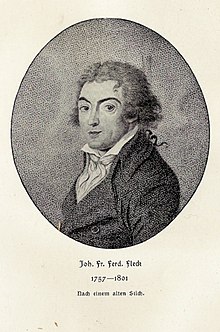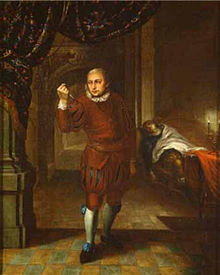Ferdinand Fleck (actor)
Johann Friedrich Ferdinand Fleck (born June 10, 1757 in Breslau (Wrocław), † December 20, 1801 in Berlin ) was a German actor and director .
Life
Even during his school days at the Maria-Magdalenen-Gymnasium in Breslau, Fleck “produced an acting in front of his classmates”. He is said to have "distinguished himself several times in allegations of guilt and smaller, dramatic amateur performances by the melodious organ and dignity of the lecture".
When he left high school in 1776, he delivered a self-written farewell speech, which was met with great applause. The father, secretary at the Breslau magistrate , had already died in 1776. With the help of friends and public funds, Ferdinand Fleck was still able to start studying. In May 1777 he enrolled in Halle (Saale) to study law , but he did not take this course very seriously. He made his debut as an actor in Leipzig in 1777 , where he also spent his apprenticeship years on the stage.
Services
From 1779 to 1781 Ferdinand Fleck was on stage in Hamburg , mainly with character roles ( Shakespeare ). A contemporary described the 22-year-old actor as follows:
The young Fleck was characterized by massive forms in noble uniformity, whose voice was resounding and heartbreaking and whose eyes sparkled with radiance. An inner dignity benefited the captivating exterior and gave his game an unprecedented security that always made him appear natural.
In 1781 Fleck went to Berlin , where he had been part of the ensemble of the Berlin National Theater from 1783 . In March 1788 he played there, highly praised, the title role in Shakespeare's “ Othello ”, arranged by Johann Gottfried Hagemeister . In 1790, Fleck was appointed director of the Royal National Theater in Berlin by the Prussian King Friedrich Wilhelm II . In 1798 he went on a tour to his home town of Breslau, where he was enthusiastically celebrated with his wife Luise, who was also an actress. In 1796 Carl Ludwig Costenoble wrote in his diary:
There was only one German actor who, as Fiesko, wore the crown in all parts of his chameleon-like character - Fleck! Shape, majesty, cunning, dignity, kindness, heroism - everything was united in the highest perfection in this darling of nature and the muses. This actor could only give a Fiesko completely and probably also a Makbeth, which role is hardly suspected in its perfection by all actors, however adored.
In 1799 he played “ Wallenstein ” in Schiller 's drama of the same name and impressed the entire theater world: August Wilhelm Iffland and Ludwig Tieck were enthusiastic, Karl Friedrich Zelter enthusiastically reported to Goethe , and Friedrich Schlegel declared Fleck the “first tragic hero on the German stage”. Jean Paul arranged to put the "Wallenstein" with Fleck on the program during his visit to Berlin. Even Schiller himself showed deep admiration for the actor in his "Wallenstein".
However, the celebrated star occasionally alienated the audience with capricious behavior on stage. Iffland, director of the National Theater, who valued Fleck as a person and as an actor, had a hard time dealing with such incidents. Fleck's repertoire comprised more than two hundred roles, including musical ones. Ferdinand Fleck is counted among the most important actors of the late 18th century. He made a happy connection between romanticism and classicism .
Death and tomb
After Ferdinand Fleck had to fight health problems for years, he succumbed to the disease on December 22nd, 1801 at the age of only 44 years. The mourning message spread beyond Germany, including France and England .

Fleck was buried in Cemetery II of the Jerusalem and New Churches in front of the Hallesches Tor in Berlin. At his own expense, August Wilhelm Iffland, who was to be buried in the same cemetery in 1814, had a grave monument erected for the late actor in 1803, which Johann Gottfried Schadow designed in classical forms. A large decorative urn stands on a square base, the sides of which are decorated with masks of tragedy and comedy. The inscription on the reverse on the base, which is hardly decipherable, reads:
- The passion flame / the nobility of high sense
- the virtue of gods / he shaped with the spirit of genius
- astonished listeners in the heart / and the vice shook.
- The stubborn old man / the mocked eccentric
- the courtly flatterers / he faithfully held up the mirror
- and the gates blushed!
- True, noble, great / on stage and in life
- good-hearted friend / affectionate husband and father
- he went to see great things upstairs / suspecting what he felt down here.
His widow, the twenty years younger actress Sophie Louise b. Mühl (1777–1846), was later buried next to Fleck. Her second husband, the chamber musician and flautist August Gottlieb Schröck (1779–1854), whom she married in 1807, also rests here.
In March 1802 a commemorative medal was minted in memory of the great actor and theater director Ferdinand Fleck.
family
Ferdinand Fleck married Louise Mühl on August 9, 1793. Both daughters Wilhelmine Louise Fleck (1794–1824) and Henriette Friederike Fleck (1795–1873) were also actresses. Friedrich Wilhelm Gubitz , who married Henriette, was thus his son-in-law.
literature
- Ludwig Eisenberg : Large biographical lexicon of the German stage in the XIX. Century . Published by Paul List , Leipzig 1903, p. 263 ff., ( Digitized version ).
- Joseph Kürschner : Fleck, Ferdinand . In: Allgemeine Deutsche Biographie (ADB). Volume 7, Duncker & Humblot, Leipzig 1877, pp. 108-111.
- Wolfgang Drews, The Greats of German Drama, Portraits from Two Centuries , Berlin 1941
- Hans Knudsen : Fleck, Johann Friedrich Ferdinand. In: New German Biography (NDB). Volume 5, Duncker & Humblot, Berlin 1961, ISBN 3-428-00186-9 , p. 227 ( digitized version ).
Web links
Individual evidence
- ^ Edgar Groß , Johann Friedrich Ferdinand Fleck , Berlin 1914 (Writings of the Society for Theater History, Vol. XXII)
- ^ Hans-Jürgen Mende : Lexicon of Berlin burial places . Pharus-Plan, Berlin 2018, ISBN 978-3-86514-206-1 , pp. 231–3, 235. Cemetery I and II of the Jerusalem and New Churches . Description of the cemetery in the database of the Berlin State Monuments Office (accessed on March 25, 2019). Fleck, Johann Friedrich Ferdinand . Short biography and description of the tomb on the website of the Society for the History of Berlin (accessed on March 25, 2019).
| personal data | |
|---|---|
| SURNAME | Fleck, Ferdinand |
| ALTERNATIVE NAMES | Fleck, Johann Friedrich Ferdinand (full name) |
| BRIEF DESCRIPTION | German actor |
| DATE OF BIRTH | June 10, 1757 |
| PLACE OF BIRTH | Wroclaw (Wroclaw) |
| DATE OF DEATH | December 20, 1801 |
| Place of death | Berlin |

